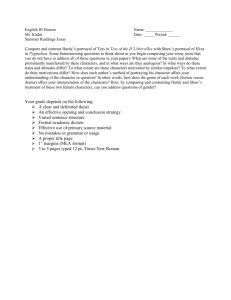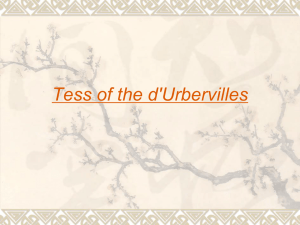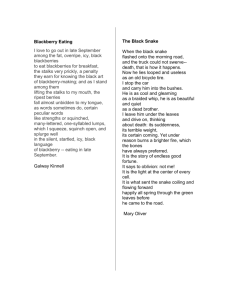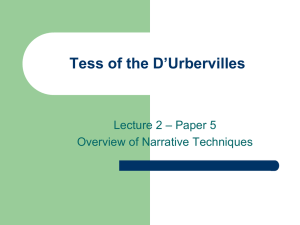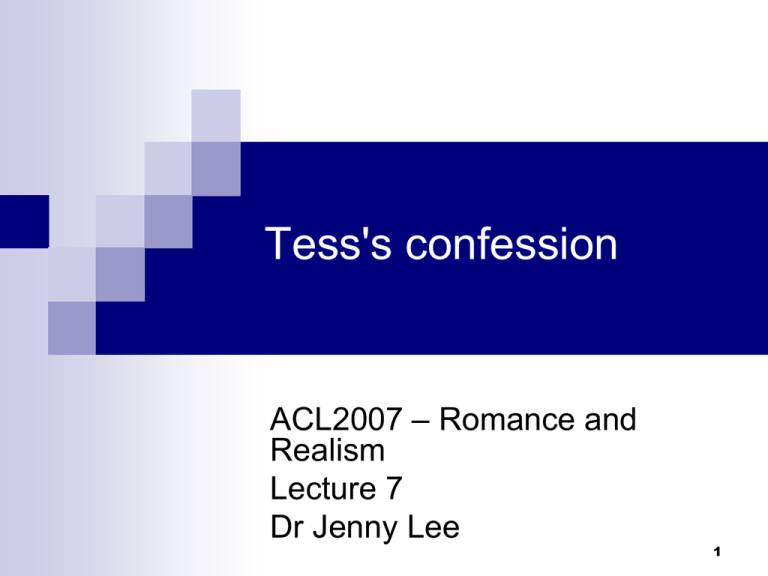
Tess's confession
ACL2007 – Romance and
Realism
Lecture 7
Dr Jenny Lee
1
Tell us what learning, living and support is like at VU in April 2010 and you could win one of the following
great prizes:
• Entertainment pack with PS3, PlayTV, BluRay remote, HDMI cable and $100 JBHiFi voucher
• Dell Inspiron Mini 10 netbook with case
• $200 Coles Myer gift card
Students will also go into a national draw by i-graduate to win $1000 cold hard cash.
www.vu.edu.au/competitions
2
Overview
Gender roles and the construction of Tess as a character
The sex act/rape in The Chase
Tess's passivity and submissiveness
I am going to argue that Tess experiences ‘dissociative’
psychological states due to traumatic situations
The various versions of the ‘rape’ published in different
years
Representations of the women in Tess
Representations of the men and Tess's reactions to
them
Tess's inability to articulate or empower herself during
conflict
The confession
3
Hardy’s choices
Let’s look at the choices Hardy makes in the way he sets up the
narrative:
The main character is a woman – Tess
Her social background – poor and not very well educated
She’s young and naïve
Her personality combines submissiveness and a high degree of
sensitivity
She is physically attractive to a variety of men
Her sensitivity makes her capable of being spiritually idealised –
Angel sees her as something pure to be protected
Alec sees her as an object of desire
Neither of them see her as an independent person with desires and
rights that exist independent of her relationship with men
4
Tess's characterisation
Hardy creates a character in Tess that contributes to the unfortunate
series of events. She has certain traits that contribute to her
downfall:
Her submissiveness
Her unwillingness to follow her own instincts
Her susceptibility to emotional blackmail from her family and from
Alec, and from Angel
Her suppression of her anger and her sense of justice
Her total trust in people she loves
Her inability to articulate and understand her emotions clearly
Her inability to articulate her anger properly. Immediately after an
angry or assertive outburst, she becomes even more submissive,
rather than following through on her anger (we will look at this in
terms of dissociative states)
5
Tess: ‘vessel of emotion’?
We are told by the narrator before Tess meets Alec:
‘Tess Durbeyfield at this time of her life was a mere
vessel of emotion untinctured by experience’ (15).
Hardy is taking pains to point out that Tess is not
experienced, she is not logical – she is pure emotion.
Hardy has made a decision to create a female character
who lacks logic, who is a ‘mere vessel of emotion’. We
can question: how much is Hardy stereotyping here?
Does Tess behave as a ‘mere vessel of emotion’
throughout the novel? We’ll consider this.
6
Gender roles
Let’s look at the purpose of Hardy’s construction of Tess.
Gender roles and expectations influence and form
Tess's life.
This is the world of values that Hardy existed in. In this
world, a woman’s value is based on:
chastity
her physical appearance
Virtue in a woman is entirely about chastity before
marriage and virtue after – almost entirely sexual.
The full original title of the novel is Tess of the
D'Urbervilles: A Pure Woman Faithfully Presented.
7
Moral values
It’s these moral values that form the framework of the
tragedy.
Tess's passivity (which can be irritating to a modern
reader) is necessary.
In order to critique these moral values Hardy needs a
main character who primarily accepts these values and
is made a victim of them.
Hardy is intending a realistic portrayal of an unrealistic
set of moral values.
He is showing the effects of the notion of the time; that
women are there to be desired and they don’t exist as
independent sexual beings.
8
The sex act in the woods
Let’s look at the act that Tess later
‘confesses’ to Angel, before we discuss
the confession of the act
What are the circumstances that lead up
to the sex act, and what is it in Tess's
personality/psychology that leads her to
that moment in the woods?
9
Tess's passivity
Tess doesn’t understand her feelings – she feels them, but cannot
articulate them.
This is important for the events that happen later in the novel.
Tess's instincts were warning her, but she was too innocent to be
able to consciously articulate the danger Alec poses to her.
Here she says she doesn’t want to go and work for the D’Urbervilles,
but she can’t explain why:
‘I would rather stay here with father and you,’ she said, nervously
reflecting.
‘But why?’
‘I’d rather not tell you why, mother; indeed, I don’t quite know why.’
(53)
10
Tess's passivity - examples
There are several occasions here where Tess ‘gives in’ to pressure
from others.
When she doesn’t want to go and work for the D’Urbervilles: her
siblings, who have heard the mother’s wish that Tess marry Alec
and become a lady, ‘wailed, with square mouths’ that they won’t
have a new horse, golden money, Tess won’t look pretty, etc. Her
mother chimes in and agrees. Tess at last agrees to go.
After this, just before Tess goes, she wears her ordinary weekday
clothes. Her mother wants her to dress in her ‘best’ (which makes
her look older), in order to look pretty. Tess agrees with ‘calm
abandonment’
‘And to please her parent the girl puts herself quite in Joan’s hands,
saying serenely – ‘Do what you like with me, mother.’ (57)
11
Other women in the text
Not all the women are passive.
Tess's mother drinks, so does Marian (from the
dairy).
Retty, from the dairy, tries to kill herself.
Mercy Chant - the woman that Angel was
supposed to marry – is completely consumed by
the church, and finds her identity in her religion.
But there’s not an example of an assertive,
successful woman in the novel – there’s no one
modeling that behaviour in the novel.
12
Joan Durbyfield - Tess's mother
Tess's mother has several moments of misgiving about sending
Tess to the D’Urbervilles but she doesn’t act on this. She wishes she
had found out whether ‘the gentleman is really a good-hearted
young man’ (61).
Joan Durbyfield always managed to find consolation somewhere:
‘Well, as one of the genuine stock, she ought to make her way with
‘en, if she plays her trump card aright. And if he don’t marry her
afore he will after. For that he’s all afire wi’ love for her any eye can
see.’ (61-62).
Joan is saying here that she half-expects Alec to seduce Tess – and
marry her ‘afore or after’ that act. She is hoping that Alec is a
gentleman and will marry Tess whether they have sex before
marriage or not.
A good mother of the time wouldn’t have allowed her daughter to go
with Alec, and wouldn’t have left it to ‘fate’ whether Tess made a
good marriage.
NOTE: There is a lot of evidence to show that both Tess's parents
are neglectful of her, and would have been throughout her
childhood.
13
Tess's dissociative states
In pivotal moments, where Tess feels powerless, I’m
going to argue that she goes into what could be
considered, in psychological terms, a ‘dissociative state’.
In the novel, Tess's state of mind is described at different
times as ‘abstracted half-hypnotised’, ‘like one in a
dream’, ‘inattentively’, ‘unconsciously’, ‘vaguely’, ‘nearly
unconscious’.
A dissociated state is described as ‘depersonalised,
numbed, trance state, robotic state, dream-like state’
(Weber, 2008: 210).
Recent evidence: ‘The thesis that trauma leads to
dissociation is strongly supported by the literature and in
fact is stronger than ever’ (Bremner, 2008: 5).
14
More detail about dissociation
Weber states (emphasis added): Children and adolescents may present with a variety of
dissociative symptoms that reflect a lack of coherence or integration in the selfassembly of mental functioning, including the following typical characteristics:
Inconsistent consciousness may be reflected in symptoms of fluctuating attention,
such as trance states or “black outs.”
Fluctuating moods and behavior, including rage episodes and regressions, may
reflect difficulties in self-regulation.
Depersonalization and derealization may reflect a subjective sense of dissociation
from normal body sensation and perception, or from a sense of self (Schore,
2001).
Dissociative symptoms have been found to correlate with traumatic histories of
significant sexual abuse or physical abuse (Coons, 1996; Dell & Eisenhower, 2000;
Hornstein & Putnam, 2002; Macfie, Cicchetti, & Toth,
2001; Trickett, Noll, Reiffman, & Putnam, 2001)…Dissociative symptoms in children
have also been associated with parenting styles described as severely
neglectful (Brunner, Parzer, Schuld, & Resch, 2000; Ogawa et al., 1997; Sanders &
Giolas, 2001), severely rejecting, and highly inconsistent (Mann & Sanders, 1994).
Reference:
Weber, S (2008) ‘Diagnosis of Trauma and Abuse-related Dissociative Symptom
Disorders in Children and Adolescents’, Journal of Child and Adolescent Psychiatric
Nursing, 21(4), 205–212.
15
Tess’s reactions
When Alec wants Tess to eat a strawberry that he holds to her mouth.
She says no twice, but Alec ignores her:
“Nonsense!” he insisted; and in a slight distress she parted her lips
and took it in.
They had spent some time wandering desultorily thus, Tess eating
in an abstracted half-hypnotised state whatever D’Urberville offered
her. When she could consume no more of the strawberries he filled
her little basket with them; and then the two passed round to the
rose-trees, whence he gathered blossoms and gave her to put in her
bosom. She obeyed, still like one in a dream, and when she could
affix no more he himself tucked a bud or two into her hat, and
heaped her basket with others in the prodigality of his bounty
(emphasis added, 48-49).
16
Further evidence of Tess's
dissociative state of mind
When Alec is going too fast down the hills:
When Alec is dropping her home after the act in the woods and the
time she has spent at the D’Urbervilles:
…D’Urberville gave her the kiss of mastery. No sooner had he done so
than she flushed with shame, took out her handkerchief, and wiped the
spot on her cheek that had been touched by his lips. His ardour was
nettled a the sight, for the act on her part had been unconsciously done
(my emphasis, 65).
She thereupon turned round and lifted her face to his, and remained like
a marble term while he imprinted a kiss upon her cheek – half
perfunctorily, half as if zest had not yet quite died out. Her eyes vaguely
rested upon the remotest trees in the lane while the kiss was given, as
though she were nearly unconscious of what he did (my emphasis, 93).
After Angel judges her for her past:
She did sit down, without knowing where she was, that vacant look still
upon her face, and her eyes such as to make his flesh creep (277).
17
The act in the woods
Considering Tess's tendency to ‘stare unconsciously’, I
propose that this is likely to be the state she went into
during the sex act in the woods. But before she goes into
these states, she protests.
This doesn’t mean that Alec didn’t drug and rape her:
He went to the horse, took a druggist’s bottle from a parcel on
the saddle, and after some trouble in opening it held it to her
mouth unawares. Tess sputtered and coughed, and gasping “it
will go on my pretty frock!” swallowed as he poured, to prevent
the catastrophe she feared (86).
But because Hardy doesn’t show the act, some theorists
have interpreted it differently.
Tess clearly sees herself at fault – she stays at the
D’Urbervilles for a while after the act too.
18
The various versions
The scene in The Chase differs in different versions of the text. Davis discusses the
different versions in his paper ‘The Rape of Tess’:
In an early edition, Hardy changes the druggist bottle for alcohol.
In 1891 he uses a druggist’s bottle which is most likely to contain spirits, or could
have been a narcotic.
By 1912 he removed the druggist bottle but adds tears to Tess’s face.
Most versions of the text don’t have the druggist bottle, but the Penguin edition has
gone back to the 1891 text where Alec drugs Tess.
It’s not possible to say which version is the definitive one, and what led to Hardy
make these changes (pressure from publishers could have been a reason).
It would be defined as rape today, but in the morality of the day, it is ambiguous, and
Tess is made to live with it as her fault in the eyes of society.
Although, from the narrator’s words: ‘But where was Tess's guardian angel’ (88), it
seems fairly obvious that it was rape.
Reference:
Davis, W (1997) ‘The Rape of Tess: Hardy, English Law, and the Case for Sexual
Assault’,
Nineteenth-Century Literature, 52(2) 221-231.
19
Representations of the men
The innocent girl seduced by a rake is a small section of the novel.
Angel thinks he is modern, progressive, up-to-date.
What Hardy is showing is that in that society, so persuasive are
these ideas, that the most progressive thinker in the novel is as
capable of being as cruel as the heartless rake.
When Tess is at her most desperate – it’s Alec who plucks her and
her family out of the gutter.
What choice does Tess have at this point – she wouldn’t be in this
position if Angel had made sure she was alright.
There’s no other way for Angel to conceive of woman and virtue
than the way that he has. To that extent, Tess's tragedy is Angel’s
tragedy too.
Angel is the chief instrument in Tess's tragedy. Alec is a misfortune.
But Angel is a disaster and makes her situation irretrievably lifechanging.
20
Angel’s idealisation of Tess
We get some insight into what Angel is thinking at the start of their
honeymoon, just before the confessions have happened:
Looking at her silently for a long time: ‘She is a dear dear Tess,’ he
thought to himself, as one deciding on the true construction of difficult
passage. ‘Do I realize solemnly enough how utterly and irretrievably this
little womanly thing is the creature of my good or bad faith and fortune?
I think not. I think I could not, unless I were a woman myself. What I am,
she is. What I become she must become. What I cannot be she cannot
be. And shall I ever neglect her, or hurt her, or even forget to consider
her? God forbid such a crime!’ (264)
What Angel is conceiving here is a romantic view of marriage –
women have to be protected, and don’t have an identity beyond their
man and their marriage.
Both the rake and the idealist/independent thinker – neither are
looking at her as a whole person.
Soon after this, Angel rejects Tess because she no longer fulfils his
romantic ideal of what a woman of that time is supposed to be.
21
Angel and romanticism
Angel is concerned with romanticised visions of nature.
He wishes to work a farm, to draw on idealised energies
of the earth and nature.
His excessive idealisation of Tess's earthy purity is part
of this idealisation.
It is this idealisation that makes Angel a hypocrite in the
face of Tess's more complex lived reality.
Angel’s transformation through Tess's redemption of him
is a sign (or hope) of a new model of a more passive,
less objectifying masculinity.
22
Angel and social reality
In Angel, Tess expects to have found a romantic, understanding and
socially progressive hero (in opposition to the dastardly Alec
D'Urberville).
Tess spends a lot of emotional energy attempting to preserve
herself from the kinds of moral judgements she is subject to in
Victorian society.
However Hardy offers Angel (ironically named – or perhaps
appropriately given his too-high idealism and idealisation of Tess as
a chaste, pure rural being) as a model of Victorian sexual hypocrisy.
Here social realities are critiqued through the device of undermining
the romance.
She is viewed by Alec as a sexual being, and in the first instance by
Angel as a woman of sexual virtue. Angel’s reaction to her
confession is to cast her in the opposing binary.
23
Tess's reactions to the men
Her reaction to the two men mirrors the way she was treated.
Alec desires her as an object of desire and her reaction to him is a
physical revulsion.
Tess is idealised by Angel and she idealises him – to a great
degree.
Tess feels that Alec owes her support whereas Angel’s parents
don’t. Her conception of Angel is as romanticised as his is of her.
She can’t accept charity – can’t go to Angel’s family for money. She
feels she married him under false pretences, therefore she has no
rights.
Alec approaches her and she finally accepts his help – she knows
he owes her and she doesn’t feel that Angel owes her anything.
24
Realism and romanticism
Women of the time were expected to be chaste, a ‘prize’,
or else a whore, a damaged woman.
Hardy is presenting Tess and other women in the story
as more complex than this. His representation of Tess,
her mother, the dairy maids includes – abuse of alcohol,
suicide attempts, un-chaste lives.
Hardy is trying to reveal what these lives are really like
(realism), rather representing romantic notions of
women.
However, some of the narrator’s descriptions of Tess’s
physicality are also idealised and romanticised –
perhaps a case of Hardy falling under the spell of Tess,
which has been argued by some.
25
The confession scene
Tess keeps the jewelery from Angel’s family on during
the confession – perhaps to appear of a higher status,
perhaps to link to Angel’s ancestry, perhaps to try to look
more beautiful.
Angel confesses, ‘he went to London and plunged into
eight-and-forty hours’ dissipation with a stranger’ (273).
Tess says, ‘Oh, Angel – I am almost glad – because now
you can forgive me!’ (273).
Hardy doesn’t show Tess's confession, but the narrator
states: ‘she entered on her story of her acquaintance
with Alec D’Urberville and its results, murmuring the
words without flinching, and with her eyelids drooping
down’ (274).
26
The confession: ‘The Woman Pays’
Tess asks for Angel’s forgiveness, as she has forgiven him. Angel says, ‘Forgiveness
does not apply to the case. You were one person; now you are another’ (276).
Tess says, ‘I thought, Angel, that you loved me – me, my very self…Having begun to
love ‘ee, I love ‘ee for ever – in all changes, in all disgraces, because you are
yourself. I ask no more. Then how can you, O my own husband, stop loving me?’
‘I repeat, the woman I have been loving is not you.’
‘But who?’
‘Another woman in your shape.’
She perceived in his words the realisation of her own apprehensive foreboding in
former times. He looked upon her as a species of imposter; a guilty woman in the
guise of an innocent one. Terror was upon her white face as she saw it; her cheek
was flaccid, and her mouth had the aspect of a round little hole. The horrible sense of
his view of her so deadened her that she staggered; and he stepped forward, thinking
she was going to fall.
‘Sit down, sit down,’ he said in pure pity. ‘You are ill; and it is natural that you should
be.’
She did sit down, without knowing where she was, that vacant look still upon her face,
and her eyes such as to make his flesh creep. (my emphasis, 277)
At the end of this scene, she dissociates again. She has just been judged for an act
she is ashamed of and feels guilty about (you could argue that she is ‘retraumatised’).
Alec committed the initial act. Angel is judging her no longer the woman he can love
because of the act. It makes sense that she would become ‘ vacant’ or dissociate
again.
27
Tess's anger
Overall, Tess is a passive but reactive character.
But she is pushed at points so that she asserts herself in a few
instances; her anger, her feelings. In these instances she doesn’t
just react or parrot what she is told.
Remember one of the symptoms of dissociation is ‘Fluctuating
moods and behavior, including rage episodes and regressions’
(Weber, 2008), which can be seen in her behaviour in these scenes:
After Alec has driven too fast down the hills.
Her argument with the priest over whether her child goes to heaven
(argues with a key authority figure – a man, a priest – anger makes her
assert herself about her child going to heaven).
Angry letter to Angel saying he’s treated her shamefully and she doesn’t
think she can ever forgive him.
When she kills Alec.
28
Tess's rage
When Alec has driven her down the hills really fast
and forced her to kiss him:
‘You ought to be ashamed of yourself for using
such wicked words!’ cried Tess with spirit, from
the top of the hedge into which she had
scrambled. ‘I don’t like you at all! I hate and
detest you! I’ll go back to mother, I will!’ (66).
29
Tess's rage – the letters
Let’s look at these two key letters Tess wrote to Angel.
In the first, very long letter, to Angel, Tess begs:
In the second, very short letter, she is angry:
I would be content, ay, glad to live with you as your servant, if I may not
as your wife; so that I could only be near you, and get glimpses of you,
and think of you as mine (411).
She passionately seized the first piece of paper that came to hand, and
scribbled the following lines:
Oh why have you treated me so monstrously, Angel! I do not deserve it.
I have thought it all over carefully, and I can never, never forgive you!
You know that I did not intend to wrong you – why have you so wronged
me? You are cruel, cruel indeed! I will try to forget you. It is all injustice I
have received at your hands! – T. (431).
After writing this letter, she goes back to Alec.
30
The murder
Tess's final act of ‘assertion’ is an inarticulate act
– an act of violence – murder.
These acts of assertion are followed by extreme
submissiveness where she does whatever she is
told.
After the angry letter to Angel, she then
becomes so submissive that she goes back to
Alec.
After the murder, she goes into a dissociative,
state, dreamlike, back to a passive state.
31
Some questions to consider
Hardy is critiquing society’s values towards women. Here
are some questions to think about here:
To what extent is Hardy complicit in the thing he is
condemning – the stereotypes?
Does Hardy push the passivity and Tess's suffering too
far?
Does the narrator makes generalisations about how
women feel/think and about Tess's appearance?
Would we question these things differently if the author
was a woman? Or if it was a historical novel, written
now?
32
Conclusion
In the end, Tess's tragedy is the tragedy that she can’t escape her
role, the role forced upon her.
Tess's few attempts to escape that role are brief and inarticulate,
and she sinks back into her role afterwards.
That’s Hardy showing how strong that role is. Those conventions are
so strong that she sinks back down into them and is ultimately
destroyed by them.
Tess's reaction to stress – she dissociates and submits, then she
reaches breaking point and she has angry responses.
Her angry and violent responses are her trying to assert herself –
but her stress is so high in these situations, that it triggers another
dissociative state.
Romanticised views of gender are expressed throughout the novel,
especially by Angel, but to a degree by the narrator.
Tess’s real situation undermines the romanticism, which Angel
eventually accepts – too late.
33


